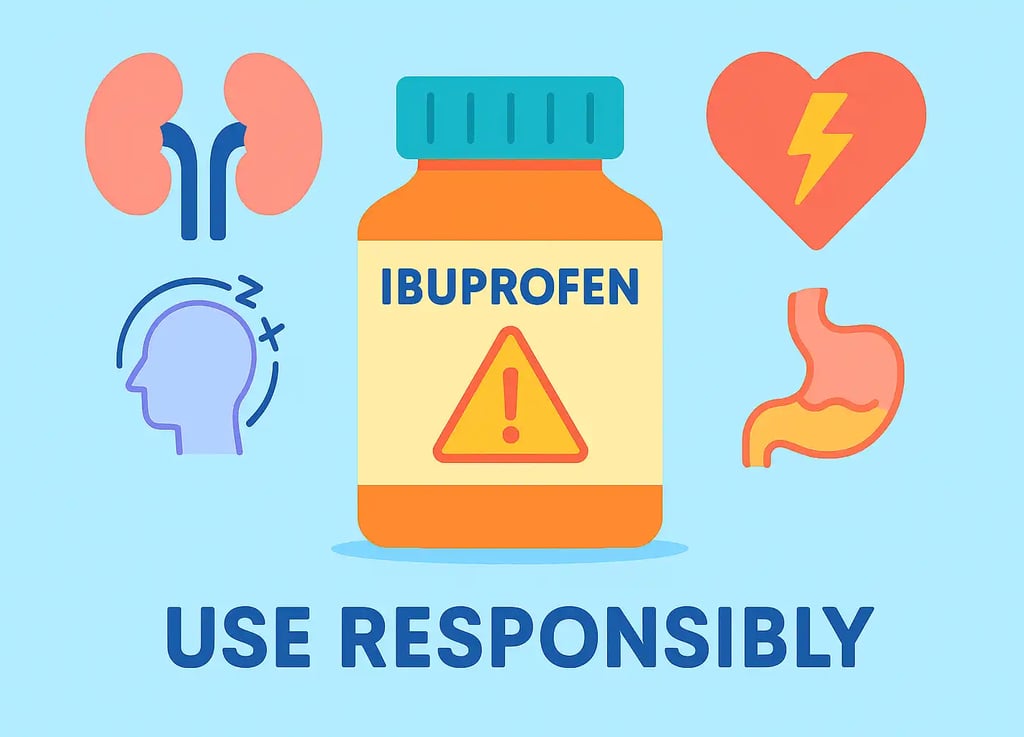The Complete Guide to Ibuprofen: What It Does, When to Use It, and How to Stay Safe
Discover how ibuprofen works, when to take it, and how to use it safely. This complete guide covers benefits, risks, and who should avoid it.


The Complete Guide to Ibuprofen: What It Does, When to Use It, and How to Stay Safe
What Is Ibuprofen?
Ibuprofen is one of the most widely used over-the-counter medications in the world. It belongs to a class of drugs known as NSAIDs — nonsteroidal anti-inflammatory drugs — which work by blocking the body’s production of certain chemicals that cause inflammation, pain, and fever.
First developed in the 1960s, ibuprofen is commonly sold under brand names like Advil and Motrin, but it's also widely available in generic form. It’s generally used to treat everything from headaches and toothaches to muscle pain, menstrual cramps, fevers, and arthritis.
How Ibuprofen Works
Ibuprofen works by inhibiting enzymes called COX-1 and COX-2, which are responsible for producing prostaglandins —hormone-like substances that promote pain, inflammation, and fever. By lowering prostaglandin levels, ibuprofen reduces these symptoms and makes you feel more comfortable. However, it does not fix the underlying cause of the problem, such as an infection, injury, or chronic condition. Instead, it provides temporary relief while the body heals or while other treatments address the root issue. In short, ibuprofen is a pain reliever — not a cure.
Because of its anti-inflammatory properties, ibuprofen is often a better choice than acetaminophen (Tylenol) when swelling or inflammation is involved — such as with sprains, strains, or joint pain.
When to Use Ibuprofen
Ibuprofen can be highly effective for:
Reducing fever
Relieving pain from injury or overuse
Managing chronic inflammatory conditions like osteoarthritis or rheumatoid arthritis
Easing menstrual cramps
Treating post-surgical or dental pain
However, it should always be used at the lowest effective dose for the shortest possible time, because it does come with possible side effects especially when it comes to longer term use. It’s not meant to be a daily-use drug unless advised by a doctor.
To see how Ibuprofen compares to other pain relievers & natural alternatives, click here.
Who Should Be Cautious Using Ibuprofen
While generally safe when used correctly, ibuprofen isn’t for everyone. People who should be especially cautious include:
Children under 6 months (unless directed by a pediatrician)
Pregnant women, especially in the third trimester
Older adults, due to higher risk of stomach, kidney, and heart side effects
Anyone with a history of ulcers, GI bleeding, or kidney disease
People taking blood thinners or other NSAIDs
Common Side Effects of Ibuprofen
Some people experience side effects when using ibuprofen, especially if used frequently or at high doses. These may include:
Upset stomach or heartburn
Nausea
Dizziness
High blood pressure
Increased risk of bleeding
Kidney strain or damage (especially with long-term use)
Always follow dosage instructions carefully, and never exceed the maximum daily limit (typically 1,200 mg for over the counter Ibuprofen). Check out Managing Ibuprofen Side Effects: What to Watch for and How to Minimize Risk.
What’s the Difference Between Advil and Motrin — or Is There One?
Advil and Motrin are actually two brand names for the same active ingredient: ibuprofen. Both work the same way to relieve pain, reduce fever, and ease inflammation. The main differences come down to the brand, packaging, and sometimes the available formulations.
For example, Advil may be more commonly sold in coated tablets or gels, while Motrin has options for children’s liquid suspensions. Effectiveness and safety are the same when taken at the recommended doses, so choosing between them is usually a matter of price, availability, or personal preference.
Safety Tips for Using Ibuprofen
To reduce risk, keep these safety guidelines in mind:
Take ibuprofen with food to reduce the possibility of getting an upset stomach
Stay hydrated to protect your kidneys
Don’t combine Ibuprofen with alcohol, as that can increase stomach and liver risks
Avoid taking multiple NSAIDs at once (e.g. ibuprofen and naproxen)
If you’re also taking aspirin for heart health, space your ibuprofen at least 8 hours apart
Only take Ibuprofen when you need, and don't make it a habit to take daily.
If you need ibuprofen for more than a few days, check with your doctor — especially if you have other medical conditions or take prescription medications. It's not something to play around with.
Final Thoughts
Ibuprofen is a powerful tool for short-term relief of pain, inflammation, and fever — but like any medication, it comes with risks. Understanding when to use it, how it works, and how to use it safely can help you get the benefits without the drawbacks. Always read the safety labels, follow dosage instructions, and consult a healthcare provider if you have any concerns.




